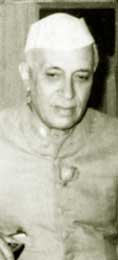|
|
| Author?s impression |
NEHRU: THE INVENTION OF INDIA
By Shashi Tharoor,
Viking, Rs 295
It takes a brave man to write a biography of Jawaharlal Nehru, especially one who admits in his preface, ?It is based on new research into previously undiscovered archives.? But Shashi Tharoor is no ordinary man and thus, one is curious to know how he ?reinterprets? Nehru. The book is competently written and reads well, but suffers from the curious paradox of taking the reader at once too much and too little for granted. On the one hand, it assumes a fairly intimate knowledge of both the national freedom movement and the post-independence years. On the other, the presentation of Nehru is fairly simplistic as would aid a reader making his first acquaintance with this complex personality. He skims the surface and is allowed a measured glimpse into the man, so that the encounter may not intimidate him.
Tharoor?s own voice is largely concentrated in Chapter X where he analyses Nehru?s legacy, the democratic institutions he built, his pan-Indian secularism, socialist economics and foreign policy of non-alignment. This analysis could, however, have been woven into the main narrative. That would have given it an edge, especially in those portions which appear as a clever synopsis.
Tharoor begins his book with a story ascribed to Nehru?s birth. Like Akbar, Nehru?s father, Motilal, was particularly unfortunate in his attempts to beget a son. Finally, he visited a yogi who reluctantly granted him a boon claiming that by doing so he had sacrificed the benefits of all the austerities he had observed in his life. The next day, the yogi died and ten months later Nehru was born on November 14, 1889.
Thus Nehru is projected as a man of destiny and every development in his life is given a dramatic slant.
There are, however, some patches of brilliant writing, expressing a deep understanding and sympathy for a man torn apart by many dilemmas. Tharoor captures succinctly and poignantly the debacle of the Indo-Chinese war of 1962, portraying Nehru as almost a tragic hero whose naivete and innocent gullibility were cut to size by China.
The last chapter is immensely relevant in its own right. In the present scenario of religious chauvinism, Nehru?s staunch adherence to secular values and insistence on the private practice of religion need to be reiterated constantly.
Tharoor skillfully puts together pieces which draw the attention of new initiates and the renewed scrutiny of those who may have forgotten. Mercifully he only hints at, and spares us scurrilous speculations about Nehru?s interest in Edwina or Padmaja Naidu. His style may be somewhat predictable but it is never clich?d. There are no illustrations in the book except for a rather spartan family tree. Photographs are scrupulously described, with a caption recording the author?s impressions.
Tharoor admits, ?I started the book as divided between admiration and criticism as when I finished it; but the more I delved into Nehru?s life, it was the admiration which deepened.?
The fact remains that it is very difficult for an Indian to take stock of Nehru without giving in to sentimentality. Tharoor?s book on Nehru is an attempt to explore his own intellectual and spiritual heritage. It is almost as if in trying to find the voice in which Nehru spoke, Tharoor discovers his own raison d??tre.











